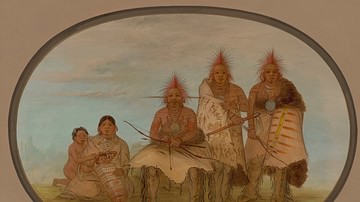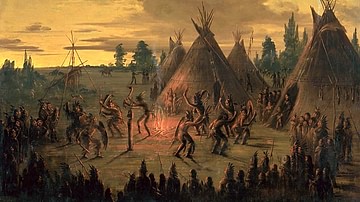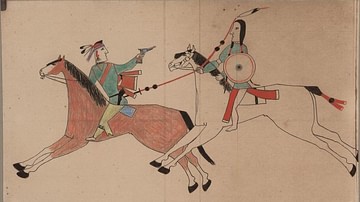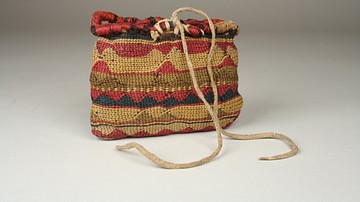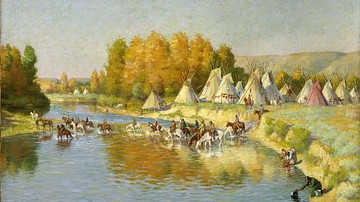A Story of Faith is a legend of the Pawnee nation similar in theme to The Boy Who Was Sacrificed and featuring the same sacred animals – the Nahu'rac – who serve Ti-ra'wa ("Father Above") from their homes in five mystical places. This story, like other Pawnee legends, focuses on the concept of everything happening for a reason.

In A Story of Faith, a young doctor, naturally endowed with healing powers, is poisoned by an older medicine man who is jealous of him and, through faith in the wisdom and justice of Ti-ra'wa, is taken on a journey of healing by a great elk and small bird (probably the interior least tern). The Nahu'rac of the greatest mystical site, Pahaku (Pahuk, Pahuk Hill in modern-day Nebraska) insist he be seen by the Nahu'rac of the other four sites before he can be healed. By submitting faithfully to their demands, the young doctor not only recovers but is granted even greater powers than before.
Text
The following comes from Pawnee Hero Stories and Folk-Tales (1889) by anthropologist and historian George Bird Grinnell. It has been edited for space, but the full story will be found in External Links below in the Grinnell book which also includes The Boy Who Was Sacrificed and another thematically linked tale, The Bear Man.
LONG ago, before they ever had any of these doctors' dances, there was, in the Kit-ke-hahk'-i tribe, a young boy, small, growing up. He seemed not to go with the other boys, nor to play with them, but would keep away from them. He would go off by himself, and lie down, and sometimes they would find him crying, or half crying. He seemed to have peculiar ways. His father and mother did not try to interfere with him but let him alone. Sometimes they would find him with mud or clay smeared over his face and head. That is the sign of a doctor. When you see a person putting mud on his face or head, it shows that he has faith in the earth. From the earth are taken the roots that they use in medicine…
The boy grew up till he came to have the ways of a young man, but he never went with any of the other boys. After he had grown up, they saw that he had something in his mind. Sometimes he would fast for two days, and sit by himself, smoking and praying to Ti-ra'-wa, and not saying anything to anyone…
When anyone in the camp was sick, this young man would take pity on him, and of his own accord would go and doctor him, and pretty soon the person would be well again. Through his doing this, the people began to hear about him, and his name became great. He was humble and did not want to be thought well of. He was not proud, but he was always doing good. At that time, there were many doctors in the tribe, and they wondered how it was that he could cure so many people, when he had never been taught by any of them. They could not understand it, and they began to be jealous of him. He never wanted to be with the doctors but liked to stay by himself…
In that time there were bad doctors, and they began to hear about this humble man and to be jealous of him…The bands of the Pawnees were not then together, as they are now. As the people talked about this young man, one of the other bands heard about him. In this band was a great doctor, and this doctor thought to himself, "This young man's influence is growing. If I do not do something, he will soon be ahead of me."
This great doctor went to the village to visit this young man, to see how he looked, and to find out how he got his knowledge and his power, for he knew he had never been taught. He wanted to eat with him, and talk with him, and find out whence his learning came. He reached the Kit-ke-hahk'-i village. He was welcomed, and the young man treated him with respect, and asked him to come into the lodge, and sit down with him. At night they talked together. The great doctor said, "I am glad to see you. You can come to me for advice sometimes." The young man thanked him. They smoked together. It is the custom always when an Indian is visiting another, for the one that is being visited to present all the smokes; but at this time the great doctor said, "We will smoke my tobacco." So all night they smoked his tobacco. The next morning, he went away. He did not again eat with the young man. He said, "I am glad, and I am going." And he went away to his village. This was in winter.
About summertime, he felt different from what he had. He was drowsy and felt badly. He felt heavy. He seemed to be swelling up with some strange new disease. The great doctor had poisoned him with this result. How it was no one can tell, but it was so. This was a disgrace, and he did not know how to get out of it. There was no way. He would go off and cry, and pray to Ti-ra'-wa, and sometimes would stay for three or four days without anything to eat. He was so miserable that one time he was going to kill himself. He did not tell his father or any one about this but kept it to himself. The tribe went off on a hunt and left the old village. Before they started, the man went off on a hill somewhere to meditate and pray, and his father told him that when he was ready to start, he should ride such a horse, and he left it in the village for him when he should come in.
When he came into the empty village, he found the horse tied there, and he saddled it and started; but instead of going in the direction the tribe had taken, he went east. (He prayed for healing).
The tribe at this time was camped on the head of the Republican River. He went on toward the east until he came to the place on the Platte River called Pa-huk' (hill island). He saw that there were many wild animals on this point, and he liked it, and thought he would stay there, and perhaps dream. He stopped there a while, feeling very badly, and mourning all the time on this point…
The fourth night something touched him. He was half awake when he felt it. Something said, "What are you doing here?" He was lying on his side, his head toward the east and his feet toward the west. Something tapped him on the shoulder, and he looked up and saw a great big animal, big black eyes, and a whitish body, Pah', big elk. When he looked at it, the animal said, "Get up and sit down;" and the elk too sat down. The elk said, "I have heard of you and of your condition, and I am here to tell you that we all know your trouble. Right here where you are, under you, is the home of the Nahu'rac (animals). I know that it is impossible to help you, but I shall let them know—they already know—that you are here. I can only help you so far as to take you to the places where these animals are. If this animal home cannot help you, I will take you to another place; if that fails, I will take you to another place; if that fails, to another. Then you will see that I have done my part. If it is impossible for the animals to do it, we have still one above that we look to." As soon as he had said this, he vanished like a wind…
While the boy sat there, thinking about what the animal had said to him, he fell asleep with his mind full of these things. In his sleep something talked to him. It said, "I know that you feel badly, and that your mind is poor. I have passed you many times, and I have heard you crying. I belong here, but I am one of the servants. I have informed my leaders, those who command me, about you, and that you are so poor in your mind, and they have said to me, ‘If you take pity on him, do as you please, because you are our servant.'"
At this time, he woke up, and saw sitting by him a little bird. He talked to it. He said, "Oh, my brother, I feel pleased that you understand my poor mind. Now take pity on me and help me." The bird said to him, "You must not talk in this way to me. I am only a servant. To-morrow night I will come this way and will show you what to do. To-morrow night I will come this way, and whatever you see me do, you do the same thing." Then he disappeared. The man then felt a little easier in his mind, and more as if there were some hope for him…
[The elk then takes the man to the four sacred sites of the Nahu'rac in turn, with the help of the bird, but none of them can help him, so they return to Pa-huk]
When the elk took him back to Pa-huk', the bird again conducted him into the lodge. He had left his pipe here. When he entered the lodge all the animals made a hissing sound—No'a—they were glad to see him again. The man stood in the middle of the lodge and spoke. He said, "Now you animals all, you are the leaders. You see how poor my mind is. I am tired of the long journeys you have sent me on. I want you to take pity on me." …
After they had smoked, they told the man to go and sit down opposite the entrance to the lodge, between the head doctors and the fire. These twelve animals stood up and walked back and forth on the opposite side of the fire from him, facing him. After a while they told him to stand up. The head ground dog now asked the other Nahu'rac to help him, by singing, and they all sang; and the ground dogs danced, keeping time to the singing, and moved their hands up and down, and made their jaws go as if eating, but did not open their mouths.
After a while they told him to lie down with his head toward the doctors and his feet toward the entrance. After he had lain down, they began to move and went round the lodge toward him, and the head ground dog jumped over the man's belly, and as he jumped over him, he was seen to have a big piece of flesh in his mouth and was eating it. Another ground dog followed him, and another, and each one ran until he came to the man, and as each one jumped over him, it had a piece of flesh in its mouth, eating it. So they kept going until they had eaten all the swelling…
The man was still unconscious, and the head ground dog said, "Now, Nahu'rac, I do not understand how to restore this man. I leave that to you." Then the ground dogs went back to their places and sat down. Then the head doctor, the beaver, spoke to the bears. He said, "Now this man belongs to you. Let me see what you can do." The head bear got up and said, "Very well, I will come. I will let you see what I can do." Then the bears stood up and began to sing. The head bear would jump on top of the man, and act as if he were going to tear him to pieces, and the others would take hold of him, and shake him around, and at last his blood began to flow and the man began to breathe, but he was still unconscious. After a while he moved and came to life and felt himself just as he had been many months before. He found that his trouble was gone and that he was cured…
The man got up and spoke to the Nahu'rac, thanking them for what they had done for him. He stayed there several nights, watching the doings of the Nahu'rac. They taught him all their ways, all the animal secrets. The head doctor said to him, "Now, I am going to send you back to your home, but I will ask a favor of you, in return for what I have done for you."
The man answered him, "It will be so, whatever you say."
The doctor said, "Through you let my animals that move in the river be fed. Now you can see who we are. I move in the water. I have no breath, but I exist. We every one of us shall die except Ti-ra'-wa. He made us, just as he made you. He made you to live in the air. We live where there is no air. You see the difference. I know where is that great water that surrounds us [the ocean]. I know that the heaven [sky] is the house of Ti-ra'-wa, and we live inside of it. You must imitate us. Do as we do. You must place your dependence on us, but still, if anything comes up that is very difficult, you must put your dependence on Ti-ra'-wa. Ask help from the ruler. He made us. He made everything. There are different ways to different creatures. What you do I do not do, and what I do you do not do. We are different. When you imitate us, you must always blow a smoke to each one of these four chief doctors, once to each; but to Ti-ra'-wa you must blow four smokes. And always blow four to the night, to the east, because something may tell you in your sleep a thing which will happen. This smoke represents the air filled with the smoke of hazy days. That smoke is pleasant to Ti-ra'-wa. He made it himself. Now go home, and after you have been there for a time, go and pay a visit to the doctor who put you in this condition."
The young man went home to his village and got there in the night. He had long been mourned as dead, and his father was now poor in mind on account of him. He went into his father's lodge, and touched him, and said, "Wake up, I am here."
His father could not believe it. He had thought him dead a long time. He said, "Is it you, or is it a ghost?"
The young man answered, "It is I, just the same as ever. Get up and go and tell my uncles and all my relations that I am here. I want you to give me something; a blue bead, and some Indian tobacco, and some buffalo meat, and a pipe."
The father went about and told his relations that his son had come back, and they were very glad, and came into the lodge, bringing the presents, and gave them to the boy. He took them, and went down to the river, and threw them in, and they were carried down to the Nahu'rac lodge at Pa-huk'.
A few days after this the boy got on his horse and rode away to visit the doctor who had brought his trouble on him. When he reached the village, the people said to the doctor, "A man is coming to visit you," and the doctor was troubled, for he knew what he had done to the boy. But he thought that he knew so much that no one could get the better of him. When the boy came to the lodge, he got off his horse, went in and was welcomed. After they had eaten, the boy said to him, "When you visited me, we smoked your tobacco; to-day we will smoke mine."
They did so, for the doctor thought that no one could overcome him. They smoked until daylight, and while they were smoking, the boy kept moving his jaws as if eating, but did not open his mouth. At daylight the boy said he must be going. He went, and when he got down to the river, he blew strongly upon the ice, and immediately the water in the river was full of blood. It was the blood of the doctor. It seems that the ground dogs had taught the young man how to do their things.
When the people found the doctor, he was dead in his lodge, and he was all hollow. All his blood and the inside of him had gone into the river and had gone down to feed the animals. So the boy kept his promise to the Nahu'rac and had revenge on the doctor.
The boy was the greatest doctor in the Kit-ke-hahk'-i band and was the first who taught them all the doctors' ceremonies that they have. He taught them all the wonderful things that the doctors can do, and many other things.
